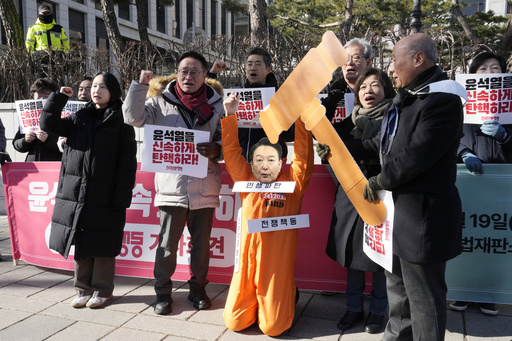
SEOUL, South Korea — President Yoon Suk Yeol of South Korea made an appearance in court on Thursday, where his legal team contested a recent arrest tied to a criminal allegation claiming he attempted to instigate a rebellion through a brief imposition of martial law in December.
In anticipation of Yoon’s arrival at the Seoul Central District Court, security was substantially increased, and numerous supporters gathered nearby to rally in his favor.
The preliminary hearing aimed to address witness testimonies and other essential preparations for the upcoming criminal trial. Additionally, the court was set to consider a request from Yoon’s attorneys to overturn his arrest and facilitate his release from custody, a request that typically has a low success rate.
Yoon was indicted on January 26 for rebellion, a charge that could result in severe penalties including death or life imprisonment. Although South Korean presidents generally enjoy immunity against a range of criminal charges, this protection does not extend to serious allegations such as rebellion or treason.
According to the indictment, Yoon’s declaration of martial law was characterized as an unlawful tactic aimed at dissolving the National Assembly and apprehending legislators and electoral officials. Yoon has defended his actions, asserting that the martial law declaration was intended only as a temporary measure against the liberal opposition, and that he always intended to honor the legislative process should they choose to retract the decree.
Following his impeachment on December 14, Yoon’s executive powers were rendered ineffective, and the Constitutional Court is nearing a ruling on whether to formally oust him from office or to annul the impeachment, reinstating him.
The martial law that Yoon had declared was lifted merely six hours later; however, it has instigated significant political unrest, complicated high-level diplomatic relations, and tested the robustness of Korea’s democratic framework. In response to his arrest being sanctioned by the Seoul Western District Court last month, Yoon’s conservative backers erupted in protests. His legal representatives and ruling political party have also raised doubts about the objectivity of the legal and law enforcement systems involved in the case.
Continuing to express disdain for his liberal opponents, Yoon has accused them of hindering his political agenda and has supported unfounded conspiracy theories concerning electoral fraud, using these claims to rationalize his controversial authoritarian measures.
Moreover, Yoon’s defense minister, police chief, and various military leaders have faced their own legal troubles, having been arrested and indicted on charges tied to rebellion, misuse of power, and other offenses associated with the martial law declaration, an event that included the deployment of heavily armed forces to the National Assembly and offices of the National Election Commission.

